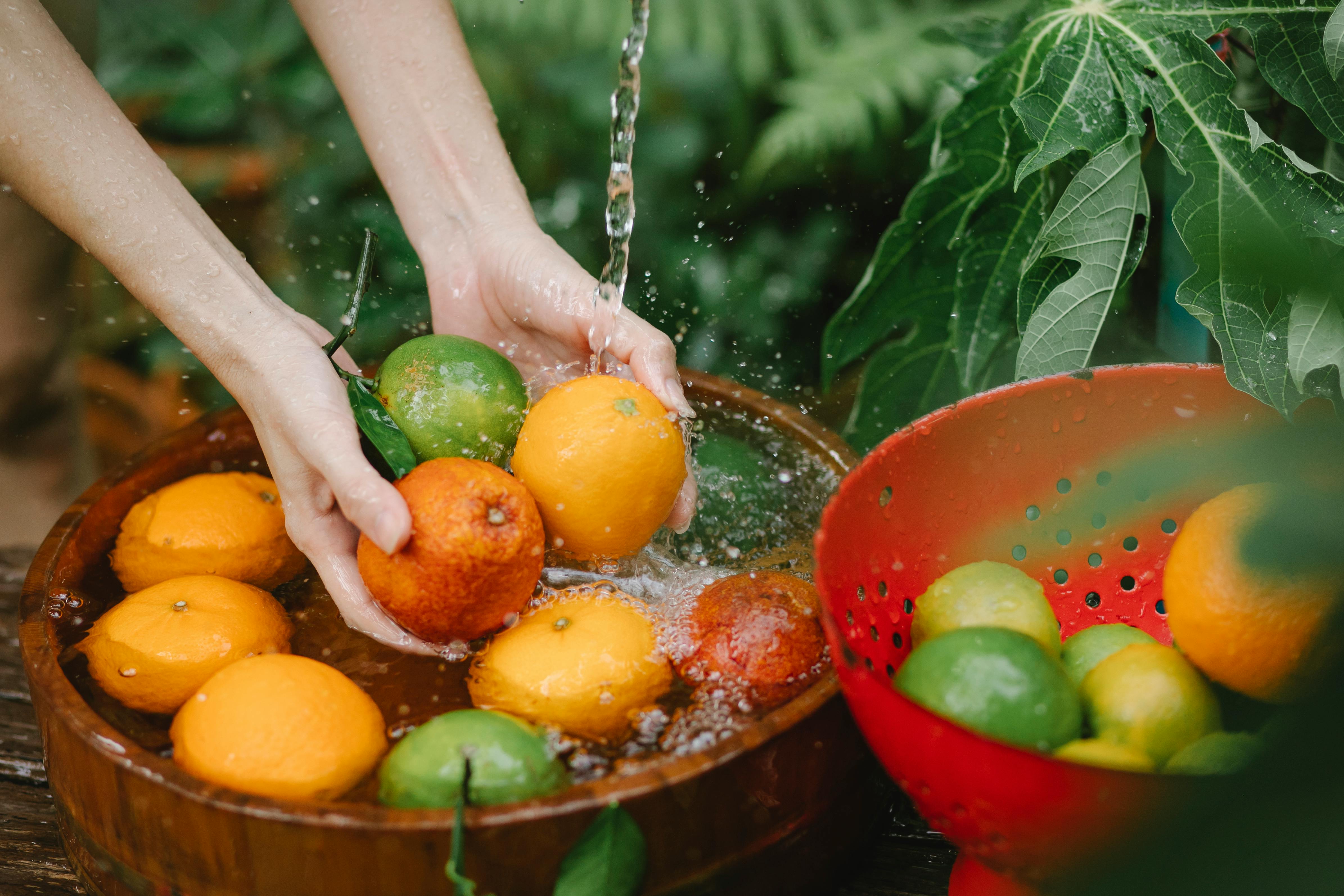Do you ever wonder if it’s safe to wash fruit with baking soda? Many people believe that washing fruit with baking soda can help remove dirt, wax, and other contaminants from the surface of the fruit. In this article, we will explore the potential benefits and risks of washing fruit with baking soda. We will also look at how to do it safely, as well as other tips for keeping your fruits clean and fresh.Yes, you can wash fruits with baking soda. Baking soda is an effective natural cleaner that helps remove dirt and residue from fruits. To wash fruits with baking soda, first fill a bowl or sink with lukewarm water and add a tablespoon of baking soda to it. Then, place the fruits into the water and gently rub them together to remove any dirt or residue. Rinse the fruits with cold water once you are done scrubbing and they will be clean and ready to eat.
Benefits of Washing Fruits With Baking Soda
Washing fruits with baking soda is becoming an increasingly popular way to keep produce fresh and free from harmful bacteria and contaminants. Baking soda is a natural, non-toxic substance that can be used to disinfect and sanitize fruits without the use of harsh chemicals or cleaners. It is also effective in removing dirt, grime, and other residues that can accumulate on the surface of fruits. Baking soda also helps to neutralize any odors that may be present on the fruit. The following are some of the key benefits of washing fruits with baking soda:
One of the primary benefits of using baking soda to wash fruits is that it is a natural, non-toxic alternative to chemical cleaners. Unlike many chemical cleaners, it does not leave behind any toxic residue or emit any dangerous fumes. Additionally, it does not contain any harsh abrasive ingredients that can damage the delicate skin of fruits such as apples, pears, and peaches.
Another advantage of using baking soda to clean fruit is that it helps to remove dirt and grime without leaving behind any residue. This makes it an ideal choice for those who wish to avoid leaving behind potentially harmful residues on their produce. Baking soda is also effective at removing odors from fruits such as garlic or onion odors.
Finally, baking soda helps to maintain the pH balance on the surface of fruits. This can help keep them fresher for longer periods of time by preventing spoilage caused by bacteria and other contaminants. It also helps to reduce browning due to oxidation which can occur when exposed to air or light for extended periods of time.
Washing Fruits With Baking Soda
Washing fruits with baking soda is a simple and effective way to remove dirt, bacteria, and pesticide residue from the surface of produce. Here are the steps to follow when washing your fruits with baking soda:
1. Fill a large bowl or sink with cool water. Add 1 teaspoon of baking soda for every 2 liters (2 quarts) of water. Stir the baking soda into the water until it is completely dissolved.
2. Place the fruits in the bowl or sink and let them soak for 5-10 minutes. This will give the baking soda time to work its magic and loosen any dirt or residue on the produce.
3. Gently scrub each piece of fruit with a clean brush or cloth to remove any stubborn particles. Make sure to rinse off any excess baking soda.
4. Once you have finished scrubbing, transfer the fruits to a colander or strainer and rinse them thoroughly under cool running water for at least 30 seconds.
5. Place the washed fruits on some paper towels to dry before enjoying them!
Following these steps will ensure that your produce is clean and free of contaminants before eating it. Washing your fruits with baking soda is also an inexpensive and natural way to keep your family safe from food-borne illness!
Types Of Fruits That Can Be Washed With Baking Soda
Baking soda is a great natural cleaner, and it can be used to wash many types of fruits. Apples, peaches, pears, oranges, lemons, and limes are all fruits that can be washed with baking soda. Apples should be washed using a mixture of baking soda and water, while other fruits can simply be soaked in a solution of baking soda and water for several minutes before rinsing them off. Baking soda is also effective for removing wax from the skin of some fruits such as apples and citrus.
For extra cleaning power, baking soda can also be used with white vinegar or lemon juice. This combination creates an acidic solution that helps to cut through dirt and debris more effectively than just plain water or baking soda alone. The acidic solution should not be left on the fruit for too long; it should only stay on the skin for a few minutes before being rinsed off with cold water.
In addition to cleaning fruit with baking soda, it can also be used to disinfect the surfaces where fruit is stored or prepared. Baking soda diluted in water makes an effective disinfectant spray that can help keep your kitchen surfaces clean and free from bacteria.
Baking soda is a versatile natural cleaner that can effectively remove dirt and debris from many types of fruits without the use of harsh chemicals or cleaners. When washing fruit with baking soda, make sure to rinse them well before consuming them so that no residue remains on the skin or inside the fruit itself.
Is It Safe To Wash Fruits With Baking Soda?
Washing fruits with baking soda is a popular method of cleaning produce, and many people believe it is a safe and effective way to remove dirt, wax, bacteria, and pesticides from fruits and vegetables. However, there is some debate about the safety of using baking soda to wash your fruits and vegetables.
Baking soda is generally considered safe for use as a food additive or baking ingredient, but some experts have raised concerns about its safety when used for washing fruits and vegetables. The main concern is that washing produce with baking soda can leave behind residues that may be harmful if consumed. Additionally, it may not be effective at removing all contaminants from produce.
In general, it’s best to exercise caution when using baking soda to wash your fruits and vegetables. If you do decide to use it, make sure to rinse the produce thoroughly after washing them with baking soda. This will help ensure that any residue left behind does not end up in your food.
It’s also important to keep in mind that while washing your produce with baking soda can help reduce the levels of some contaminants on the surface of fruits and vegetables, it will not necessarily eliminate all potential sources of contamination such as bacteria or viruses. Therefore, it’s important to always take other steps such as peeling or cooking your produce before eating it in order to reduce your risk of food-borne illness.

Washing Fruits with Baking Soda
Washing fruits with baking soda is a great way to remove dirt, pesticides, and wax from the surface without using harsh chemicals. Baking soda is an effective and natural cleaner that is safe for use on fruits. The amount of baking soda needed for washing fruits depends on the size of the fruit and how dirty it is. For most fruits, a mixture of one teaspoon of baking soda in a bowl of water should be enough to do the job.
If the fruit is particularly dirty or has a thick layer of wax, then you may need to increase the amount of baking soda used in order to effectively remove all contaminants. It is also important to note that baking soda can be abrasive when used in large amounts, so it is best to start with smaller amounts and then increase as needed.
Once you have mixed together the baking soda and water, take a clean cloth or brush and gently scrub the fruit with it until all dirt, pesticides, and wax have been removed. Rinse off any remaining residue with clean water before consuming or storing the fruit.
Overall, washing fruits with baking soda is an easy and efficient way to remove unwanted contaminants from the surface of your produce without using harsh chemicals. The amount needed can vary depending on how dirty the fruit is but generally speaking a teaspoon of baking soda should be enough for most fruits.
Washing Fruits with Baking Soda
Washing fruits with baking soda is a great way to remove dirt, bacteria, and other contaminants from your produce. Baking soda is a natural cleaning agent that can help reduce the amount of pesticides and other chemicals that may be present on the surface of fruits and vegetables. It is also effective at removing residual waxes and other coatings that may have been applied during storage or handling. The process of washing fruits with baking soda is relatively simple and takes just a few minutes.
To begin, fill a large bowl or sink with cold water. Add one tablespoon of baking soda for every two cups of water used. Once the baking soda has dissolved, add your fruits or vegetables to the water and let them soak for about 10 minutes. After soaking, use a soft brush to scrub each piece of fruit or vegetable lightly to remove any remaining dirt or contaminants. Rinse the produce thoroughly under cold running water before consuming or cooking.
Overall, washing fruits with baking soda is an effective way to remove dirt and other contaminants from your produce without using harsh chemicals. The process should take no more than 10 minutes, making it an easy solution for keeping your food safe and healthy to eat.
What Are The Risks Of Washing Fruits With Baking Soda?
Using baking soda to wash fruits may seem like an effective and safe way to clean produce, however, there are some potential risks associated with this practice. Baking soda is an alkaline substance, which means it is basic in nature. This can potentially cause damage to the delicate skin of fruits, leading to bruising and other adverse effects. Additionally, baking soda is not 100% natural and may contain small amounts of contaminants that could be harmful if ingested.
Furthermore, using baking soda on fruits can also lead to a bitter taste or aftertaste due to its alkaline nature. This may be especially true for softer fruits such as grapes and berries. Additionally, washing fruits with baking soda can also reduce the nutritional value of the produce over time as some vitamins and minerals may be leached out in the process.
Finally, using too much baking soda or leaving it on the fruit for too long can lead to an excessively soapy taste or texture. This is because baking soda reacts with water and forms a soapy solution that can be difficult to rinse off completely. As a result, it is important to use only small amounts of baking soda when washing fruits and make sure that it is completely rinsed off before consuming them.

Conclusion
Washing fruit with baking soda can be a great way to remove dirt, wax, and bacteria from fruits. It is a simple and inexpensive method that can be done at home. Baking soda is also a natural ingredient that is safe for consumption, making it a better choice than harsh chemical-based cleaners. However, it should not be used as a substitute for proper food safety practices such as washing hands and cleaning surfaces before handling food. Additionally, baking soda should not be used to wash all types of fruit as it may cause damage to the skin or other parts of the fruit. Overall, baking soda can be an effective way to clean fruit when used correctly and in moderation.
It is important to remember that washing fruit with baking soda is not a substitute for proper food safety practices. Even when using baking soda, it is important to follow the guidelines set by the United States Department of Agriculture for cleaning produce properly and safely. This includes washing hands before and after handling produce, using clean cutting boards and utensils, and storing fruits in cool temperatures. Following these instructions will help ensure that fruits are eaten safely and without any risk of foodborne illnesses.
In conclusion, while washing fruit with baking soda can be an effective way to remove dirt, waxes, pesticides, and bacteria from fruits at home; it should not be used as a substitute for proper food safety practices such as handwashing or cutting board cleaning. Additionally, care should be taken when using baking soda on certain types of fruits in order to avoid damaging them or altering their taste.



